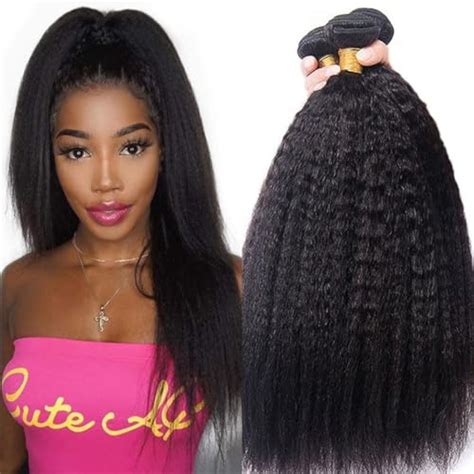Synthetic wigs have come a long way in recent years, and they now offer a wide range of styles, colors, and textures to choose from. Whether you’re looking for a natural-looking wig for everyday wear or a more dramatic wig for a special occasion, you’re sure to find the perfect one to suit your needs.

Types of Synthetic Wigs
There are two main types of synthetic wigs:
- Heat-resistant wigs can be styled with heat tools, such as blow dryers, flat irons, and curling irons. This gives you more flexibility in styling your wig, but it’s important to use low heat settings to avoid damaging the fibers.
- Non-heat-resistant wigs cannot be styled with heat tools. These wigs are typically less expensive than heat-resistant wigs, but they are also more limited in terms of styling options.
Benefits of Synthetic Wigs
Synthetic wigs offer a number of benefits over human hair wigs, including:
- They are less expensive than human hair wigs.
- They are more durable than human hair wigs.
- They are easier to care for than human hair wigs.
- They can be styled with heat tools (heat-resistant wigs only).
How to Choose the Right Synthetic Wig
When choosing a synthetic wig, it’s important to consider the following factors:
- Your face shape. The shape of your face will determine which wig styles will look best on you. If you have a round face, for example, you’ll want to choose a wig that has a lot of volume on top.
- Your hair texture. The texture of your natural hair will also affect how well a wig will blend in. If you have curly hair, for example, you’ll want to choose a wig with a similar curl pattern.
- Your lifestyle. If you’re active, you’ll want to choose a wig that is easy to care for and style. If you’re looking for a wig for a special occasion, you can choose a more glamorous wig that requires more maintenance.
How to Care for a Synthetic Wig
To keep your synthetic wig looking its best, it’s important to care for it properly. Here are a few tips:
- Wash your wig regularly. You should wash your wig every 6-8 wears, or more often if you wear it frequently. Use a mild shampoo and conditioner, and be sure to rinse the wig thoroughly.
- Detangle your wig regularly. You should detangle your wig before and after each wear. Use a wide-toothed comb or a detangling brush.
- Store your wig properly. When you’re not wearing your wig, store it in a cool, dry place. Avoid storing your wig in a plastic bag, as this can trap moisture and damage the fibers.
Synthetic Wigs FAQs
Here are some of the most common questions about synthetic wigs:
- Can I dye a synthetic wig? No, you cannot dye a synthetic wig. The fibers in synthetic wigs are not porous, so they will not absorb dye.
- Can I cut a synthetic wig? Yes, you can cut a synthetic wig. However, it’s important to use sharp scissors and to cut slowly and carefully.
- How long do synthetic wigs last? Synthetic wigs typically last for 6-12 months, depending on how well they are cared for.
Creative Applications for Synthetic Wigs
Synthetic wigs are not just for wearing on your head! Here are a few creative applications for synthetic wigs:
- Use a synthetic wig as a costume accessory. Synthetic wigs can be used to create a variety of costume looks, from historical figures to fantasy characters.
- Use a synthetic wig to add volume to your hair. If you have thin or fine hair, you can use a synthetic wig to add volume and fullness to your hair.
- Use a synthetic wig to change your hair color. If you’re not ready to commit to a permanent hair color change, you can use a synthetic wig to try out a new hair color without damaging your own hair.
Common Mistakes to Avoid
Here are a few common mistakes to avoid when wearing a synthetic wig:
- Don’t wear your wig too tight. This can damage the fibers and cause the wig to shed.
- Don’t brush your wig too often. Over-brushing can damage the fibers and cause the wig to look frizzy.
- Don’t use heat tools on your wig (unless it’s a heat-resistant wig). Heat can damage the fibers and cause the wig to melt.
- Don’t sleep in your wig. This can cause the wig to become matted and tangled.
Pros and Cons of Synthetic Wigs
Pros:
- Less expensive than human hair wigs
- More durable than human hair wigs
- Easier to care for than human hair wigs
- Can be styled with heat tools (heat-resistant wigs only)
Cons:
- Not as natural-looking as human hair wigs
- Can be more difficult to style than human hair wigs
- Can be less breathable than human hair wigs
Conclusion
Synthetic wigs are a great way to change your look without damaging your own hair. They are available in a wide range of styles, colors, and textures, so you’re sure to find the perfect one to suit your needs. With proper care, a synthetic wig can last for 6-12 months or more.
Tables
Table 1: Types of Synthetic Wigs
| Type | Description |
|---|---|
| Heat-resistant | Can be styled with heat tools |
| Non-heat-resistant | Cannot be styled with heat tools |
Table 2: Benefits of Synthetic Wigs
| Benefit | Description |
|---|---|
| Less expensive | Synthetic wigs are typically less expensive than human hair wigs. |
| More durable | Synthetic wigs are more durable than human hair wigs and can withstand more wear and tear. |
| Easier to care for | Synthetic wigs are easier to care for than human hair wigs and require less maintenance. |
| Can be styled with heat tools | Heat-resistant synthetic wigs can be styled with heat tools, giving you more flexibility in styling your wig. |
Table 3: How to Choose the Right Synthetic Wig
| Factor | Consideration |
|---|---|
| Face shape | Choose a wig style that complements your face shape. |
| Hair texture | Choose a wig with a similar curl pattern to your own hair. |
| Lifestyle | Choose a wig that is easy to care for and style if you are active. |
Table 4: How to Care for a Synthetic Wig
| Step | Instructions |
|---|---|
| Wash your wig | Wash your wig every 6-8 wears, or more often if you wear it frequently. Use a mild shampoo and conditioner, and be sure to rinse the wig thoroughly. |
| Detangle your wig | Detangle your wig before and after each wear. Use a wide-toothed comb or a detangling brush. |
| Store your wig | When you’re not wearing your wig, store it in a cool, dry place. Avoid storing your wig in a plastic bag, as this can trap moisture and damage the fibers. |
